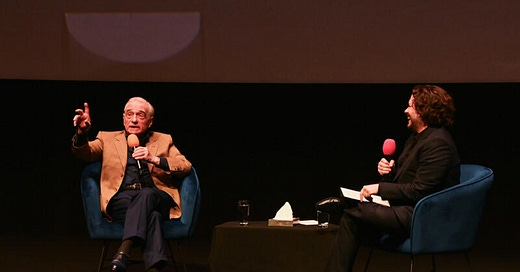Watching the greatest living director contemplate his own legacy
Martin Scorsese on Life, Art, and Cinema.
What’s great about having a new film from the greatest living director releasing this weekend, is not just that we get to see a new Martin Scorsese Picture, we also get to watch the greatest living director do a fresh run of press.
Press runs from directors vary wildly from nonexistent to snooze-fest to deeply insightful. And the latest run of interviews with Martin Scorsese has fallen firmly into the last camp.
This fantastic interview with GQ has Scorsese contemplating death and the future of cinema. Throughout these interviews he consistently mentions his desire to do more, but also his own awareness that each subsequent film might be his last. I will say I have hope we might get quite a few more from him, watching him be surprisingly spry and lively for his age in this casual chat with Timothée Chalamet.
In this tangential conversation with Edgar Wright, we see him revisiting moments from some of his own movies that he hasn’t seen in years. Most fascinating to me was the moment starting at 58:43, where we hear him re-encounter his choice to have the audience laughter drown out Rupert’s jokes in a scene from The King of Comedy. Something he says he forgot about. It’s delightful to think about Martin Scorsese himself being surprised by his own brilliant direction decades later after having forgotten it.
It’s obvious that the now 80 year old director, post-COVID, post-The Irishman, feels he has entered a new stage of life. He’s contemplating his career, his legacy, and he’s generously sharing what he’s thinking out loud with us during these interviews.
So what does Martin Scorsese see as his priority right now? He answers the question most succinctly in this interview with Associated Press:
“…what's most important in life? I figured my own way, I came to terms with that. And so I just moved from there.
Would I like to do everything? I mean, would I like to do more? Yeah. Would I like to go to everybody, everybody's parties or dinner parties and things? Yes. But you know what? I think I know enough people…
You know, would I like to go to ancient, to see the ancient Greek ruins? Yes. To go back to Sicily? Yes. To go to Naples again? Yes. You know. North Africa? Yes.
What it is, is, really I'm trying to keep alive the sense that cinema is an art form.”
These dialogues are endlessly peppered with references to the films of the past that he so clearly loves and was formed by. His concern seems to be less about bringing attention to his own new film, and more about bringing as much attention as he can to deserving classics.
One of the things I appreciate about the director is that he isn’t necessarily precious about the form. In the AP interview he says: “Many people believe it's the 20th century art form. It's not the 21st century [art form], [that’s] going to become something else. But that it should be taken that seriously, you know.”
He isn’t clinging to this idea of cinema remaining the culturally dominate art form, he just wants to see it get the recognition it’s already due. Why should we recognize cinema as art? Because, "cinema can enrich your life as works of art.”
His thoughtfulness and reflectiveness in these interviews highlights one of the aspects that has made his work enduring, and clues us into why he’s still making incredible work even now. At 80, he could just coast on re-runs of his own greatest hits. But The Irishman added a new dimension to his Gangster films, and he’s spoken about shifting gears midway through Killers of The Flower Moon after realizing he was re-treading familiar ground.
I’m fascinated by all this, because while we so often hope for careers that have a fraction of the success that someone like Scorsese has, we rarely get an intimate perspective into what that success actually means for those people. I think many of us have a false sense of hope that success is a state we could reach that feels complete. The fact that arguably our greatest living film director still very much feels like he’s figuring out what he wants to say, and who he is, strikes me as a lesson we can all learn from.
I’m excited to see the new film tomorrow, hopeful that it will be an enriching piece of cinema from one of the most prolific, influential, and thoughtful filmmakers we have alive today. And I’m grateful we’re getting to see his reflections on the form, his own career, and life.
If you enjoy my work you can support my writing financially by joining my patreon, or subscribing to this substack:




Martin Scorsese is the filmmaker who inspired me to pursue a career in screenwriting. I was raised on his films and have grappled with similar conflicts; how to live a moral life in an environment full of temptation and violence, navigating a working class neighborhood with the allure of crime around every corner. His films have always spoke to me and allowed me to make sense of life's various complexities. I can't wait to see this film! Much appreciated Thomas, I've been watching your channel for years and you always help me gain a deeper understanding of my favorite artists and their works.
I, too, am excited for this film and have been gobbling up the Scorsese interviews I've come across. Thanks for sharing these, Thomas. I look forward to watching your video about The Irishman — I missed this the first time around. Love what you do!